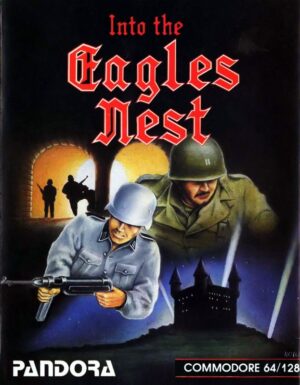Retro Replay Review
Gameplay
Ollie’s Follies stands out as a true test of precision and patience in the platforming genre. From the moment you take control of Ollie, you’ll find that every jump, drop, and dash counts. The factory levels are laid out in 24 tough screens, each one meticulously crafted to push your skills to their limits. The simple goal—reach the exit—belies the complexity hidden in each stage, where a single misstep can send you plummeting back to an earlier checkpoint or, worse, cost you one of your precious five lives.
(HEY YOU!! We hope you enjoy! We try not to run ads. So basically, this is a very expensive hobby running this site. Please consider joining us for updates, forums, and more. Network w/ us to make some cash or friends while retro gaming, and you can win some free retro games for posting. Okay, carry on 👍)
At its core, the game mechanics are straightforward: run left or right, jump, and occasionally trigger teleporters or switches. Yet the devil is in the details. Early screens introduce guard robots that patrol in predictable patterns. Learning these patterns is crucial; a mistimed leap can result in instant death. As you progress, moving platforms, laser bolts, and deflectors appear, forcing you to rethink your timing and spatial awareness on the fly. The gradual ramp-up in difficulty feels organic, giving you a sense of accomplishment as you master each new obstacle.
Collecting keys to unlock doors adds a tactical layer to the gameplay. You may spot your key early on, but retrieving it often requires detours through perilous terrain. This subtle design choice creates memorable moments—like sprinting against the clock to snag a key before it deactivates or retracing your steps while evading a newly spawned sentry. Despite the steep challenge curve, the five-life system strikes a fair balance: it’s punishing enough to keep you on your toes but generous enough to encourage repeated attempts without feeling cheap.
Graphics
Visually, Ollie’s Follies channels the classic 2D sci-fi aesthetic pioneered by designers like Frank Cohen. The horizontally layered environments are crisp and colorful, making each platform, laser emitter, and robot sentinel stand out against the dark metal backdrops. Though not pushing the boundaries of modern graphics, the game’s pixel art style is charming and evocative of early home-computer platformers.
The choice of a limited color palette contributes to the game’s readability on screen. Interactive elements—such as moving platforms or teleporters—are highlighted in bright hues that instantly draw your eye. This clarity is essential when split-second reactions are required. Environmental details, like conveyor belts, overhead pipes, and flickering lights, add depth to the levels without ever cluttering the playfield.
Animation is smooth, and Ollie’s sprite moves with a satisfying weight. You can feel the momentum in each leap and the recoil when you hit a wall or fall short. Robots patrol with mechanical precision, and laser bolts streak across the screen with a subtle glow effect. Together, these small touches create an immersive, retro-futuristic atmosphere that enhances the tension and rewards precision platforming.
Story
The narrative premise of Ollie’s Follies is delightfully simple: Ollie unwittingly stumbles into a factory overrun by evil robots. While the story doesn’t unfold through elaborate cutscenes or dialogue, it provides just enough context to motivate your run-throughs. You’re not merely clearing levels—you’re navigating a hostile machine complex to escape imminent danger.
This stripped-down approach to storytelling works in the game’s favor. By keeping the plot concise, the focus remains on gameplay intensity and level design. The looming threat of “evil robots” is effectively conveyed through in-game hazards—laser turrets, patrolling sentinels, and conveyor belts that can shove you into perilous drops. Each new screen feels like another gauntlet in Ollie’s desperate bid for freedom.
Subtle visual cues reinforce the narrative without bogging you down in exposition. Warning signs painted on factory walls, flickering red lights, and occasional sparks from malfunctioning machinery all hint at the devious intelligence running this facility. By the time you reach the late-game screens, the sense of a single, unified, mechanical menace is palpable—even without a sprawling storyline.
Overall Experience
Ollie’s Follies delivers a tightly focused platforming challenge that will appeal to players who relish mastering every nuance of level design. The game’s modest scope—24 screens—belies the depth of its difficulty and the satisfaction derived from overcoming each obstacle. Whether you’re a veteran of retro platformers or a newcomer seeking a tough but fair test, this title offers a compelling blend of trial, error, and ultimate triumph.
One of the game’s greatest strengths is its balance between accessibility and rigor. Controls are responsive, and the limited lives system encourages thoughtful play without resorting to cheap tricks. You learn to read robot patrol patterns, anticipate platform movements, and time your jumps with pixel-perfect accuracy. The result is a feedback loop of challenge and reward that keeps you coming back for “just one more try.”
While Ollie’s Follies won’t appeal to those looking for a sprawling open world or complex narrative, it shines as a distilled platforming experience. Its retro sci-fi visuals, precise level design, and escalating challenge create a memorable journey through a factory of malevolent machines. If you’re in the market for a pure, old-school platformer that demands both skill and perseverance, Ollie’s Follies is well worth your time—and your five lives.
 Retro Replay Retro Replay gaming reviews, news, emulation, geek stuff and more!
Retro Replay Retro Replay gaming reviews, news, emulation, geek stuff and more!









Reviews
There are no reviews yet.